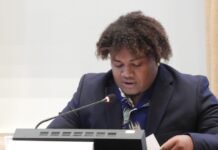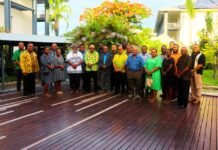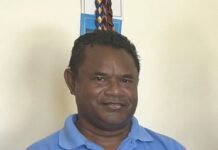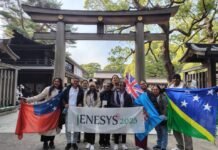
BY CHRIS ALEX
FORMER Member of the Provincial Assembly (MPA) for Makira/Ulawa Provincial Government Terence Ri’itau is advocating for trust and collaboration in governance, emphasizing the importance of these values in promoting effective leadership and decision-making.
Ri’itau, who served as MPA for Arosi East (Ward 8) for the past five years, spoke to SUNDAY ISLES about good governance, where he urged current and future leaders to prioritize trust and collaboration in their roles.
“Trust is the foundation of any successful government,” said Ri’itau. “Without the trust of the people, it is impossible to effectively govern and make decisions that benefit society as a whole.”
He also stressed the importance of collaboration among different stakeholders, including government officials, civil society organizations, and the private sector.
“Collaboration allows for a diversity of perspectives and ideas to be heard, leading to better solutions and outcomes for the community,” Ri’itau explained.
He added that there is a crucial need to bridge the gap between citizens and politicians. Ri’itau stressed that fostering trust and collaboration is pivotal in transforming the mindset of voters.
Ri’itau highlighted the necessity for an effective communication and networking system between politicians and citizens. He stressed that leaders with adept communication skills, capable of both listening to and addressing the concerns of citizens, are essential for building trust.
Moreover, Riitau stressed the importance of citizens understanding the governance systems and structures established by laws and policies at all levels.
He said that without such understanding, trust and collaboration would remain elusive.
The former MPA lamented the lack of participation and inclusiveness in the development processes of governance systems, which often leads to voter apathy and disengagement from the electoral process.
He proposed solutions such as decentralization, localization, gender equality, social justice, racial non-discrimination, equitable distribution of national wealth, and freedom of expression to address these issues.
Ri’itau also emphasized the significance of respecting ethnic diversity within Melanesian tribal systems while valuing indigenous heritages.
He argued that acknowledging and respecting multicultural settings would foster a sense of ownership and responsibility among citizens towards their authorities.
In a stern message to voters, Riitau called for accountability in the upcoming 2024 joint elections, urging the responsible exercise of democratic rights. He emphasized adherence to the rule of law governing the electoral process, warning against the threats of corruption that can undermine leadership, governance, and development aspirations.
Ri’itau’s message is a call for a renewed focus on trust and collaboration in governance and also a reminder of the pivotal role voters’ plays in shaping the future of governance and democracy in the country.
As the conversation around good governance continues, Ri’itau’s advocacy for trust and collaboration serves as a timely reminder of the values that are crucial for effective leadership and decision-making ahead of the 2024 Joint Elections on April 17.


































